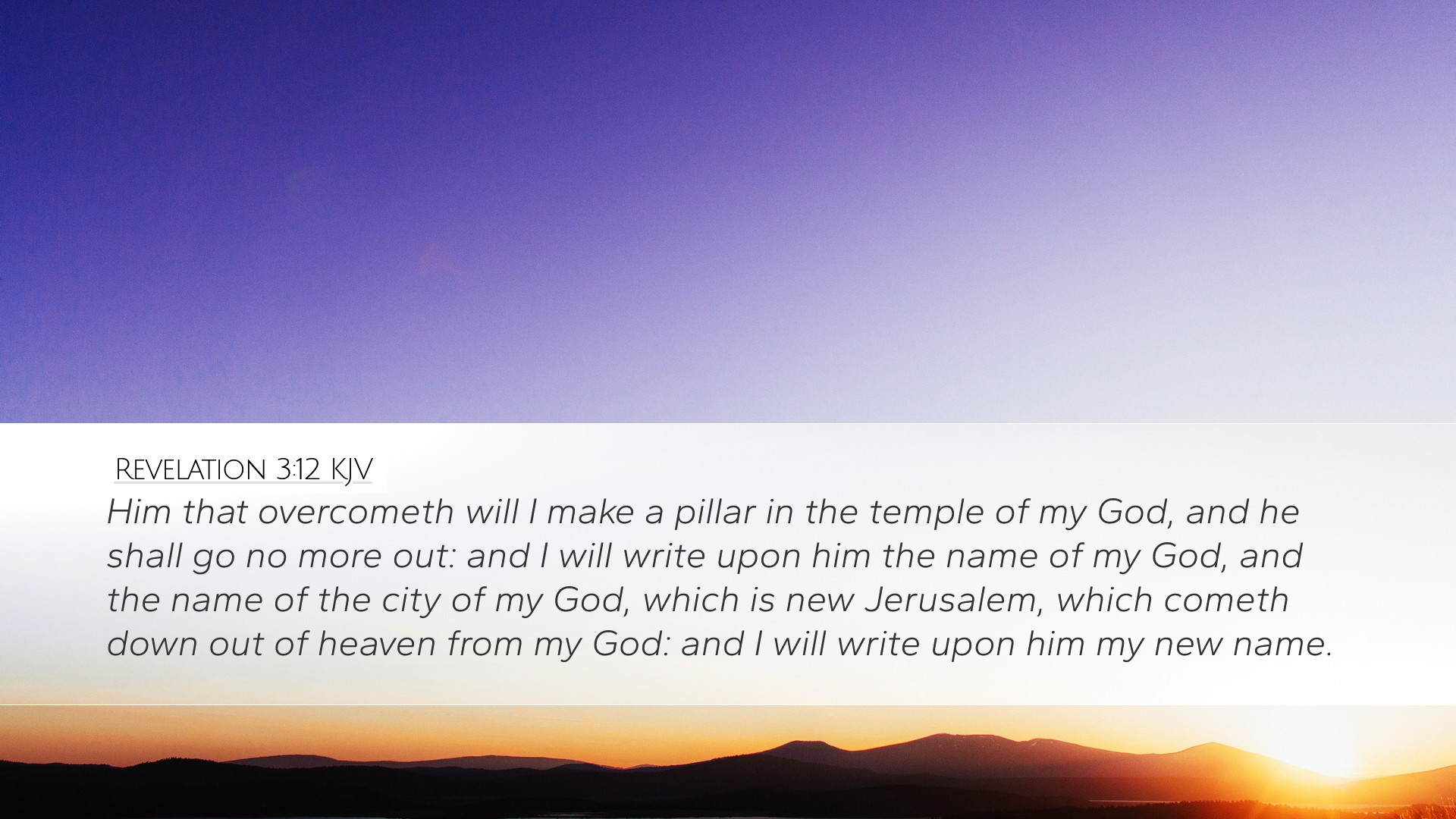Commentary on Revelation 3:12
Verse Text: "The one who conquers, I will make him a pillar in the temple of my God. Never shall he go out of it, and I will write on him the name of my God, and the name of the city of my God, the new Jerusalem, which comes down from my God out of heaven, and my own new name." (Revelation 3:12, ESV)
Introduction
The message to the church in Philadelphia, specifically captured in Revelation 3:12, reveals profound truths about perseverance, divine reward, and the eternal identity bestowed upon believers. This commentary weaves insights from esteemed public domain scholars, including Matthew Henry, Albert Barnes, and Adam Clarke, to illuminate the depth of this verse and its implications for believers today.
Contextual Background
The letters to the seven churches in Asia Minor, as recorded in the Book of Revelation, are not only historical accounts but also serve as timeless teachings to churches throughout the ages. Philadelphia, positioned strategically as a gateway between east and west, was known for its fidelity to Christianity amidst persecution. Understanding the context helps us unravel the significance of the promises made in Revelation 3:12.
Exegesis of Revelation 3:12
Pillars in the Temple
Matthew Henry interprets the figurative language used in this verse. The metaphor of being a "pillar in the temple" implies stability, permanence, and honor. In the ancient world, pillars were vital components of architecture, symbolizing strength and support. The promise of being a pillar indicates that the faithful believers will have a foundational role in God's eternal dwelling.
The Assurance of Eternal Presence
Adam Clarke expands on the meaning of "never shall he go out of it." This phrase suggests an unending relationship with God. In contrast to the temporal nature of earthly life and its tribulations, those who remain steadfast in faith are promised an eternal communion with the divine. It signifies a place where believers are secure from the trials of the world.
The Writing of God's Name
Clarke further elaborates on the significance of having God's name inscribed upon them. This act signifies ownership, belonging, and identity. In biblical times, a name carried weight, indicating authority and character. Writing God's name on His followers suggests a deep connection and acknowledgment by God of their faithfulness. They are publicly recognized as His own.
The New Jerusalem
Albert Barnes highlights the importance of "the new Jerusalem." Referring to this city as "the city of my God" conveys the idea of a heavenly abode prepared for those who follow Christ. It contrasts with the earthly cities that were often centers of persecution and immorality. The new Jerusalem epitomizes purity, peace, and rest, serving as the ultimate destination for the believers, away from earthly struggles.
Christ's New Name
The reference to "my own new name" is rich with meaning. It symbolizes a new identity and a new beginning for believers. According to Henry, this new name signifies the fulfillment of the promises made by God, indicating the transformation of the faithful into partakers of Christ's glory. This ultimate affirmation provides assurance of their relationship with Christ and His redemptive work in their lives.
Theological Implications
Endurance and Reward
This passage speaks volumes about the theme of endurance in the Christian life. The "one who conquers" signifies those who bear up under trials and temptations without faltering in faith. The victory mentioned can be seen as both spiritual and eschatological, inviting believers to look forward to their rewards in eternity.
Identity in Christ
The promise of God's name, the new Jerusalem, and Christ's new name emphasizes the transformation that comes with faith. Believers are called into a new identity that transcends earthly labels and distinctions. They become children of God, marked by His presence and purpose.
Hope and Assurance
The verse offers hope to those feeling vulnerable or persecuted, reminding them of the eternal promise that awaits those who remain faithful. The indescribable comfort of knowing that they will be pillars, secure in their belonging to God, should empower believers to continue persevering in their faith journey.
Application for Believers
- Perseverance in Faith: Believers are encouraged to remain steadfast against challenges, knowing their efforts are recognized and rewarded by God.
- Understanding Identity: Emphasizing one's identity in Christ can help combat feelings of isolation or inadequacy, reminding individuals that they are chosen and cherished.
- Hope for the Future: The promise of the new Jerusalem serves as a reminder of the hope Christians have for eternal life, encouraging them to live in a way that reflects this eternal perspective.
- Engagement in Community: As pillars are essential to the structure, believers are reminded of the importance of community, encouraging each other in faith and good works.
Conclusion
Revelation 3:12 encapsulates the essence of God's promises to His faithful followers. The imagery of pillars in the temple, the eternal presence of God, and the assurance of a new identity and a new name highlight the rich truths of the Gospel. For pastors, students, theologians, and scholars, this verse serves as a profound reminder of the hope and encouragement found in Christ, motivating them to live out their faith with the assurance of the eternal promises that await them.


